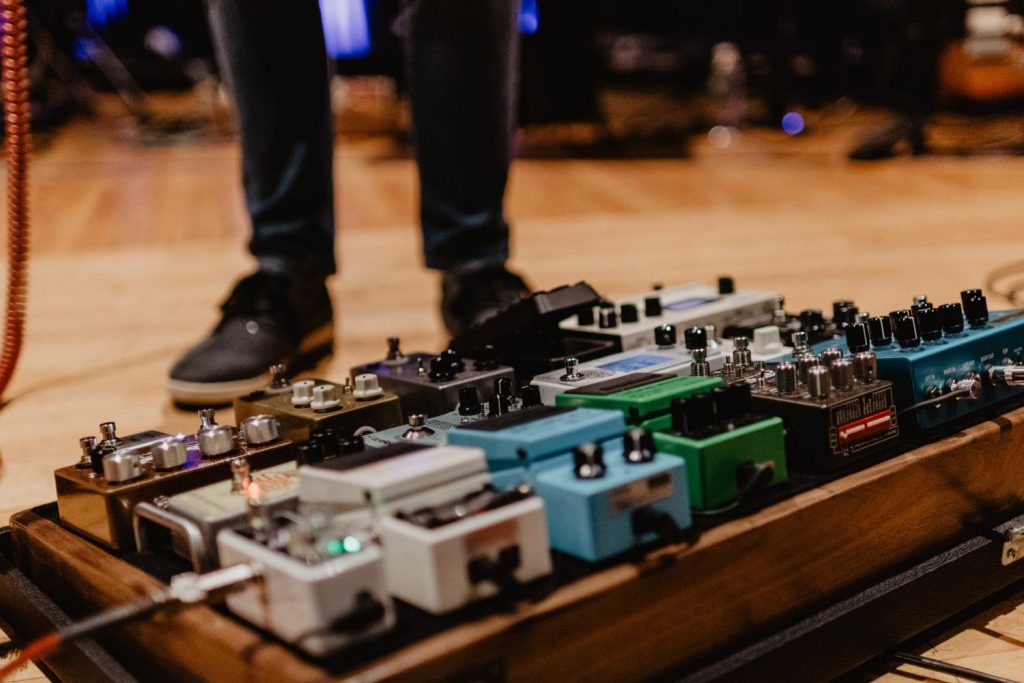FOALS are a rock band, formed in 2005, who have melded elements of indie, funk, rock and shoegaze into their own unique voice.
Having huge commercial success their entire career, from 2012’s hit single “My Number”, through 2019 albums Everything Not Saved Will Be Lost Part 1 & 2 and, most recently with 2022’s Life Is Yours, guitarists Yannis Philippakis and Jimmy Smith have straddled the line between guitar and synth masterfully, using effects to give their guitars a unique sound and feel, creating something that is instantly recognizable. Effects and drives are nothing with an instrument’s input, so let’s start there.
Read all the latest features, columns and more here.
Travis Bean Guitars
Yannis Philippakis has had an affinity for Travis Bean guitars for some time, the 70s styled, aluminium necks as synonymous as the singer himself as frontman for FOALS. Born out of an obsession with producer Steve Albini, Yannis has a bunch of Beans in his arsenal, like the uniqueness of them, both aesthetically and sonically. The aluminium neck provides a stark resonance as it’s hollow (to cut down on weight), and the resonance of it all provides a warm, smooth sound, perfect to soften the particularly percussion style of a lot of FOALS riffs.
While it’s a massive ask to recommend purchasing a guitar with an aluminium neck, Yannis often goes for guitars with humbuckers, so that’s a good place to start. They provide a nice contrast to the single-coil preferences of lead guitarist Jimmy Smith.

Fender Jazzmasters
Jimmy Smith has played Fender Jazzmasters extensively throughout FOALS’ career, the Jazzmaster’s unique single coil pickups providing girth, warmth and grit while harnessing the single coil snap and brightness that Fender is known for. These blend well with Yannis’ more boisterous humbuckers.
Jazzmaster pickups are Fender’s take on the Gibson P90 or P100 pickup, harnessing some of the fatness without being a true humbucker, but steering away from the sometimes brittle tones of single coil pickups. Jazzmasters pair well with fuzz and drive, similar to a P90 does.

Fuzz
Fuzz is a common drive in FOALS, particularly in the intro to the song “The Runner”. The fuzz morphs the guitars into more synth-like elements, the fuzz almost folding into something closer to an 8-bit sound. This is used commonly in FOALS songs, and is a must-have on the pedalboard for FOALS style tones.
Fuzzrocious Rat King
Yannis Philippakis has used a Fuzzrocious Rat King (now renamed the Cat King) pedal, which is marketed as a distortion and overdrive pedal, though when pushed to its limits, folds into itself like a fuzz. The Rat King/Cat King has different diode options and the recent addition of their double resistor mod allows the user to independently adjust how the highs and lows distort and clip. Perfect for an octave-fuzz tone…
Octave
Commonly paired with fuzz is an octave pedal, and FOALS tones can use these to further push your guitar tones to more synth-like territory. An octave pedal before a fuzz pedal forces the fuzz to process both the high and low octaves being added around your playing, blending them together for a synthesised sound.
Both Yannis and Jimmy have performed live with variants of the Electro-Harmonix POG at (and on) various stages in their career.
Delays and space
When not playing fuzzed-out riffs, Yannis and Jimmy use a lot of spacious delays and reverbs to create ambience in their songs. The key here is that the delays are often audible and more blatantly used than other musicians.
When a delay is perfectly sync’d with the music, it hides and amongst the arrangement and you hear the affect more than the effect. When the delays aren’t sync’d so perfectly, like FOALS do, you hear the effect more than the affect. Delays in FOALS songs are audible, the tails poking out between played notes, as can be heard on songs like “My Number” and “Providence”.
Slapback delay & playing style
While also these effects are good and well put into practice, Yannis Philippakis and Jimmy Smith employ a lot of funky, percussive playing to add groove and feel to their songs. Funky strumming, reggae and ska-style up-picking can help you nail the FOALS sound.
They’ll switch between this kind of playing, often with a cleaner tone and slapback delays, and larger-than-life fuzz for simpler, single note riffs for bigger sections of a song.
Keep up with FOALS here.







